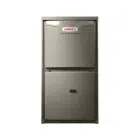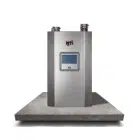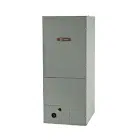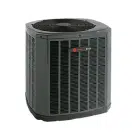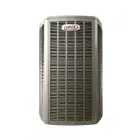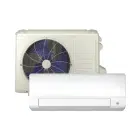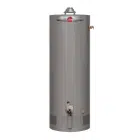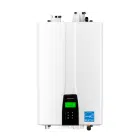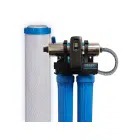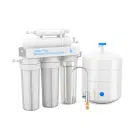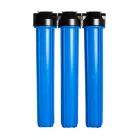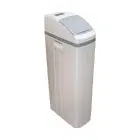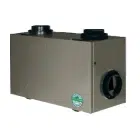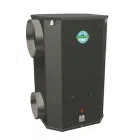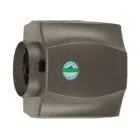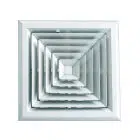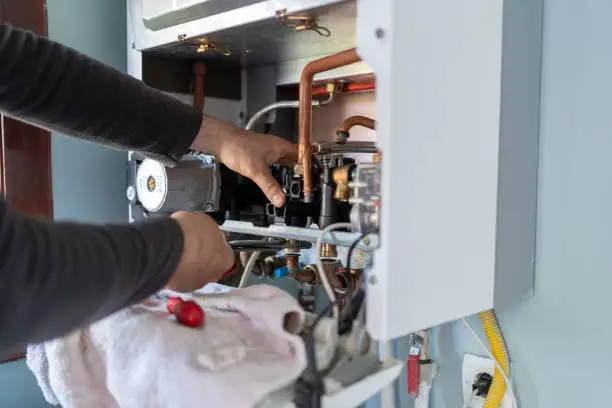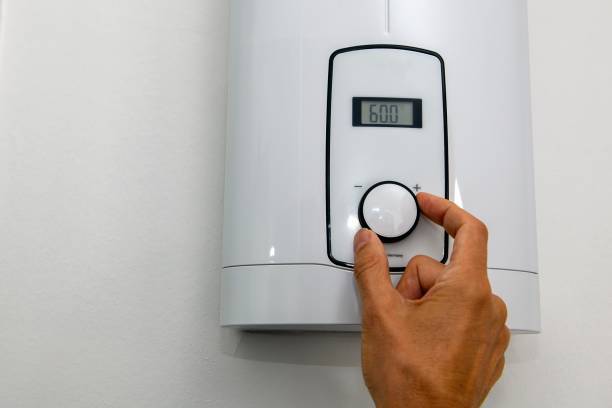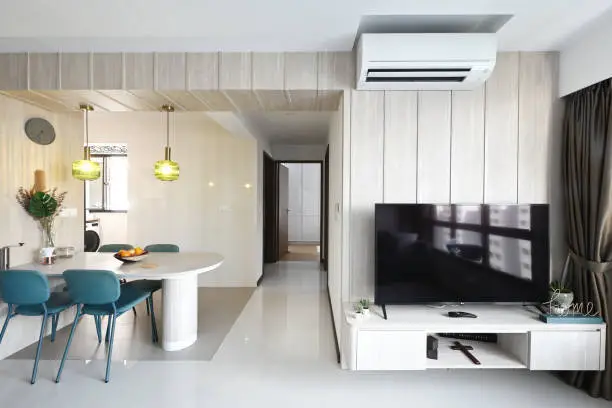
Table of Contents
- Central Air Conditioners
- Ductless Mini-Split Systems
- Window Air Conditioners
- Portable Air Conditioners
- Geothermal Air Conditioners
- Smart Air Conditioners
- Floor Mounted Air Conditioners
- VRF Systems (Variable Refrigerant Flow)
- Evaporative Coolers (Swamp Coolers)
- Choosing the Right Air Conditioner
- Conclusion
- FAQ
Maintaining a comfortable indoor environment is crucial for homes and businesses across Canada, where temperatures can fluctuate dramatically throughout the year. Selecting the right air conditioning system can be a complex decision, influenced by various factors such as the size of the space, budget, and specific cooling needs. This guide aims to simplify that process by exploring ten different types of air conditioners and providing insights on how to choose the best one for your requirements.
Central Air Conditioners
Central air conditioners are perhaps the most well-known type of cooling system, commonly found in larger homes and buildings. These systems use a network of ducts to distribute cool air throughout the entire space. The heart of the system is the central unit, which cools the air before it is circulated.
One of the primary advantages of central air conditioning is its ability to cool large areas evenly. This makes it ideal for homes with multiple rooms or open floor plans. Additionally, modern central air systems are highly efficient, which can lead to significant energy savings over time.
However, the installation of a central air conditioning system can be costly, especially if your home does not already have ductwork. Regular maintenance is also essential to ensure the system operates efficiently and effectively.
For larger homes or buildings where consistent cooling across multiple rooms is needed, central air conditioners are an excellent choice. They provide reliable, even cooling and can significantly enhance indoor comfort.
Ductless Mini-Split Systems
Ductless mini-split systems offer a flexible and efficient cooling solution, particularly for homes without existing ductwork. These systems consist of an outdoor compressor unit connected to one or more indoor units, which can be mounted on walls or ceilings.
The primary benefit of ductless systems is their flexibility. Each indoor unit can be controlled independently, allowing for customized cooling in different rooms. This can lead to energy savings, as you can cool only the rooms you are using. Ductless systems are also relatively easy to install compared to central air conditioners.
On the downside, ductless mini-split systems can have a higher upfront cost than some other types of air conditioners. They also require regular maintenance to ensure each indoor unit functions properly.
For homes without ductwork or those needing targeted cooling in specific rooms, ductless mini-split systems provide an efficient and flexible solution.
Check out the 7 best ductless mini-split air conditioners in 2024 in our previous guide via the link below.
Window Air Conditioners
Window air conditioners are a popular choice for cooling single rooms. These units are installed in a window and expel heat outside while cooling the air inside. They are a cost-effective and straightforward option for cooling small spaces.
One of the main advantages of window air conditioners is their affordability. They are also relatively easy to install and remove, making them a good option for renters or those needing temporary cooling solutions. Additionally, window units come in various sizes, allowing you to choose one that fits the dimensions of your room.
However, window air conditioners have limitations. They can block the window they are installed in, which can be a drawback if natural light and ventilation are important to you. They also tend to be less energy-efficient than some other types of air conditioners and can be noisy.
For small rooms or temporary cooling needs, window air conditioners offer an economical and easy-to-install solution.
Portable Air Conditioners
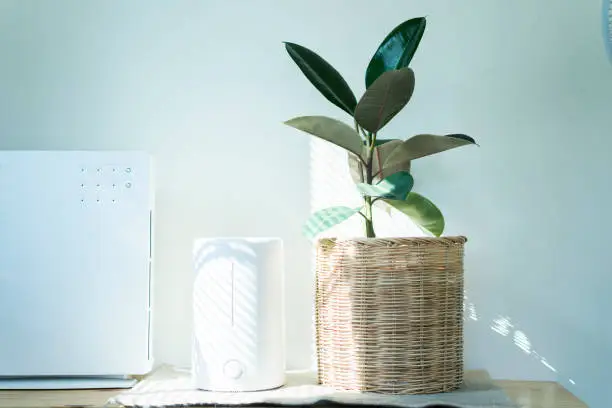
Portable air conditioners provide a convenient cooling solution for those who need flexibility. These units can be moved from room to room and require no permanent installation, making them ideal for renters or those needing a temporary cooling option.
The biggest advantage of portable air conditioners is their mobility. They can be easily moved and set up wherever needed, provided there is an outlet and a window or another way to vent the exhaust. They are also relatively easy to install and don’t require any modifications to your home.
However, portable air conditioners can be noisy and less efficient than other types of air conditioning systems. They also require regular maintenance, such as emptying the condensate tank and cleaning the filters.
For those needing a flexible and temporary cooling solution, portable air conditioners are a practical choice.
Hybrid/Dual Fuel Air Conditioners
Hybrid or dual fuel air conditioners combine the benefits of electric air conditioning with the efficiency of a gas furnace. These systems can switch between using electricity and gas, depending on which is more efficient at the time.
The main benefit of hybrid systems is their energy efficiency. By switching between electric and gas power, they can provide consistent cooling while minimizing energy costs. This makes them an environmentally friendly option as well.
However, hybrid air conditioners come with a higher initial cost and can be complex to install. They require a professional assessment to determine the best setup for your home.
For areas with fluctuating energy costs and those looking for an eco-friendly option, hybrid air conditioners offer a versatile and efficient solution.
Geothermal Air Conditioners
Geothermal air conditioners use the stable temperatures of the ground to provide cooling. These systems consist of a heat pump connected to a series of underground pipes that exchange heat with the earth.
The primary advantage of geothermal systems is their exceptional energy efficiency. They use significantly less electricity than traditional air conditioning systems and can also provide heating during the winter. Additionally, they have a long lifespan and require minimal maintenance.
However, the initial cost of installing a geothermal air conditioning system can be high, as it involves significant excavation work. They also require sufficient land area for the underground pipes.
For those looking for a long-term investment in energy efficiency and sustainability, geothermal air conditioners are an excellent choice.
Smart Air Conditioners

Smart air conditioners integrate modern technology to offer advanced control and efficiency. These units can be controlled remotely via smartphone apps, allowing you to adjust settings from anywhere.
The biggest advantage of smart air conditioners is convenience. You can monitor and control your system remotely, ensuring your home is cool when you arrive and saving energy when you’re away. Many smart units also offer features like scheduling, energy usage reports, and integration with other smart home devices.
On the downside, smart air conditioners can be more expensive than traditional units and require a stable Wi-Fi connection for optimal functionality.
For tech-savvy users looking for convenience and advanced features, smart air conditioners provide a cutting-edge solution.
Floor Mounted Air Conditioners
Floor-mounted air conditioners are a less common option that can be useful in certain situations. These units are installed at floor level, making them accessible for maintenance and ideal for homes with slanted walls or low ceilings.
The main advantage of floor-mounted units is their accessibility. They are easy to maintain and don’t require high wall space for installation. They can also provide efficient cooling for specific areas.
However, floor-mounted air conditioners can take up valuable floor space and are less common than other types, which can make them harder to find and more expensive.
For homes with unique architectural features or those needing accessible cooling solutions, floor-mounted air conditioners offer a practical option.
VRF Systems (Variable Refrigerant Flow)
VRF systems are advanced air conditioning systems commonly used in commercial buildings but are also suitable for large homes. They use refrigerant as the cooling and heating medium and can precisely control the temperature in different zones.
The main benefit of VRF systems is their efficiency and flexibility. They can provide customized cooling to different areas, making them ideal for buildings with varying cooling needs. They are also very quiet and can be integrated with existing ductwork or used with ductless indoor units.
However, VRF systems are expensive and require professional installation. They are best suited for large projects where their efficiency and customization can be fully utilized.
For large buildings or homes with complex cooling needs, VRF systems provide a highly efficient and flexible solution.
Evaporative Coolers (Swamp Coolers)
Evaporative coolers, also known as swamp coolers, use the natural process of evaporation to cool the air. They are most effective in dry climates, where they can add moisture to the air while cooling it.
The primary advantage of evaporative coolers is their energy efficiency. They use much less electricity than traditional air conditioners and can also improve indoor air quality by adding humidity. They are also relatively inexpensive to purchase and operate.
However, evaporative coolers are only suitable for dry climates. In humid areas, they are less effective and can actually make the indoor air feel more uncomfortable. They also require regular maintenance to prevent mold and mildew growth.
For those living in dry climates looking for an energy-efficient cooling solution, evaporative coolers offer a cost-effective option.
Choosing the Right Air Conditioner
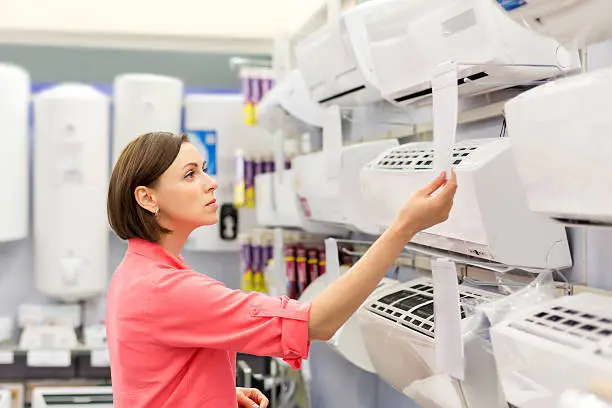
Choosing the right air conditioner units is a crucial decision that can significantly impact your comfort and energy costs. This section will guide you through the key factors to consider to ensure you select the most suitable air conditioning system for your personal needs.
Assess Your Needs
The first step in choosing the right air conditioner is to assess your specific needs. Consider the size of the space you need to cool and the local climate.
Space Size:
- Small Rooms: For smaller spaces like bedrooms or home offices, window air conditioners or portable air conditioners might be sufficient. These units are cost-effective and easy to install.
- Medium to Large Rooms: For larger spaces or multiple rooms, a ductless mini-split system can provide efficient and flexible cooling.
- Whole House: For entire homes, especially larger ones, central air conditioning systems are ideal. They provide consistent and even cooling throughout the house.
Climate:
- Dry Climates: In dry areas, evaporative coolers (swamp coolers) can be highly effective and energy-efficient.
- Humid Climates: In humid regions, traditional air conditioners like central air, ductless mini-splits, or window units are more suitable.
By assessing the size of your space and the climate, you can narrow down the types of air conditioners that will best meet your needs.
Explore and discover your perfect air conditioner type by visiting our official website.
Energy Efficiency
Energy efficiency is another critical factor. High energy efficiency ratings mean lower electricity bills and a reduced environmental footprint. Look for air conditioning units with Energy Star certification, which meet strict energy efficiency guidelines set by the Environmental Protection Agency (EPA). The Seasonal Energy Efficiency Ratio (SEER) measures the efficiency of air conditioning systems, with higher SEER ratings indicating more efficient units. Central air conditioners, for example, often have SEER ratings of 13 or higher. Additionally, air conditioners with inverter technology can adjust the speed of the compressor to match the cooling demand, leading to significant energy savings. Investing in an energy-efficient air conditioning system may have a higher upfront cost, but it can result in substantial savings on energy bills over time.
Budget Considerations
Balancing the initial cost of the air conditioning unit with long-term savings is essential. Different types of air conditioners come with varying price tags, both in terms of purchase and installation.
Upfront Costs:
- Low to Moderate Cost: Window air conditioners and portable air conditioners are generally less expensive to purchase and install.
- Moderate to High Cost: Ductless mini-split systems and central air conditioners have higher initial costs, especially if ductwork needs to be installed or upgraded.
- High Cost: Geothermal air conditioners and VRF systems have the highest upfront costs due to their complex installation requirements.
Long-Term Savings:
- Energy Efficiency: Energy-efficient units, such as those with high SEER ratings or geothermal systems, can save significant money on energy bills over their lifespan.
- Maintenance Costs: Consider the maintenance requirements of each system. For example, central air conditioning systems require regular duct cleaning, while portable units need frequent filter changes and condensate management.
When evaluating your budget, consider both the initial investment and the potential long-term savings on energy and maintenance.
Alternative Solutions
If you’re concerned about the potential downsides of a fully air conditioner cover, there are alternative solutions to consider.
Partial Covers
Partial covers are designed to protect only the top of the unit. These covers prevent debris from falling directly into the air conditioner while allowing for airflow around the sides. This can help mitigate the risk of moisture trapping and provide some level of protection from snow and ice. Partial covers offer a balanced solution that provides protection without completely enclosing the unit.
Regular Maintenance
One of the best ways to protect your air conditioner, regardless of whether you cover it, is through regular maintenance. Cleaning the unit regularly, removing debris, and ensuring that the components are in good working order can help prevent many of the issues that covering aims to address. Regular air conditioner maintenance should include checking for any signs of wear and tear, cleaning the coils and fins, and ensuring that the drainage system is functioning correctly.
Conclusion
Selecting the right air conditioner involves careful consideration of your needs, energy efficiency, budget, and the benefits of professional consultation. By assessing the size of your space, understanding the local climate, prioritizing energy efficiency, balancing costs, and seeking professional advice, you can choose an air conditioning system that will provide optimal comfort and savings.
If you need further assistance or a professional consultation, feel free to contact our HVAC Service Solutions team in Canada. We’re here to help you find the perfect cooling solution for your needs.
Frequent Asked Questions
What are the different types of air conditioning systems available?
There are several types of air conditioning systems to choose from:
- Central air conditioners: These are ideal for whole-house cooling, utilizing ducts to distribute cooled air evenly.
- Ductless mini-split systems: Perfect for homes without ductwork, these systems allow for individualized temperature control in different zones.
- Window air conditioners: Affordable and easy to install, they are suitable for cooling single rooms or small spaces.
- Portable air conditioners: Versatile and movable, these units can be used in various rooms as needed.
- Evaporative coolers (swamp coolers): Effective in dry climates, they use water evaporation to cool air and are energy-efficient.
- Hybrid/dual fuel air conditioners: These systems switch between electric and gas heating depending on outdoor temperatures.
- Geothermal air conditioners: Utilize the stable temperature of the ground for efficient heating and cooling.
- Smart air conditioners: Connected to Wi-Fi, these units offer remote control and energy monitoring capabilities.
- Floor-mounted air conditioners: These units are installed on the floor and are suitable for spaces with specific architectural constraints.
VRF (Variable Refrigerant Flow) systems: Designed for larger buildings, they offer flexible zoning and energy-efficient operation.
How do I choose the right air conditioner for my home or business?
When selecting an air conditioner, consider:
- Space Size: Choose a unit that matches the square footage of the area you need to cool.
- Climate: Consider whether you live in a hot and humid or dry climate, as different systems perform better in each.
- Energy Efficiency: Look for units with high SEER ratings for long-term energy savings.
- Installation Requirements: Evaluate whether your home or business has existing ductwork or if ductless options are more suitable.
- Budget: Balance upfront costs with long-term energy savings and maintenance expenses.
Consulting with an HVAC professional can provide personalized recommendations based on your specific needs and ensure optimal system performance.
What are SEER ratings, and why are they important?
SEER (Seasonal Energy Efficiency Ratio) ratings indicate the energy efficiency of air conditioners. A higher SEER rating means the system consumes less energy to produce the same cooling output compared to lower SEER units. Energy Star certified units typically have higher SEER ratings, which can lead to significant savings on utility bills over time. Understanding SEER ratings helps consumers make informed decisions about energy-efficient appliances that align with their budget and environmental goals.
How can I improve the energy efficiency of my air conditioner?
Enhancing the energy efficiency of your air conditioner involves several strategies:
- Regular Maintenance: Keep filters clean and replace them as recommended to ensure efficient airflow.
- Temperature Control: Use programmable thermostats to adjust temperatures based on occupancy and time of day.
- Insulation and Sealing: Insulate ducts, seal windows and doors to minimize air leaks, and reduce the workload on your AC.
- Upgrade to Energy-Efficient Units: Consider replacing older units with newer models featuring advanced technologies like inverter compressors or variable-speed motors.
Implementing these practices not only improves energy efficiency but also extends the lifespan of your air conditioning system.
What are the benefits of professional installation of an air conditioning system?
Professional installation ensures that your air conditioning system operates at peak efficiency from day one. HVAC professionals can:
- Assess Your Needs: Conduct a thorough evaluation of your home or business to recommend the right size and type of air conditioner.
- Ensure Proper Installation: Install and calibrate the unit correctly to maximize efficiency and performance.
- Optimize Airflow: Position the unit and ductwork for optimal airflow distribution throughout your space.
- Minimize Energy Waste: Prevent common installation errors that can lead to inefficiencies and higher operating costs.
- Provide Warranty Coverage: Offer warranties on both equipment and labor, ensuring peace of mind and protection against unforeseen issues.
By investing in professional installation, you ensure that your air conditioning system operates reliably and efficiently, saving you money in the long run.
How often should air conditioning systems be maintained?
Regular maintenance is essential to keep your air conditioning system running smoothly and efficiently. HVAC experts recommend:
- Annual Inspections: Schedule professional inspections before each cooling season to check for leaks, inspect ductwork, and test system performance.
- Filter Replacement: Clean or replace filters every one to three months, depending on usage, to maintain airflow and indoor air quality.
- Coil Cleaning: Clean evaporator and condenser coils annually to remove dirt and debris that can hinder heat transfer.
- Refrigerant Levels: Ensure refrigerant levels are optimal, as low levels can indicate leaks or other issues that affect cooling efficiency.
Regular maintenance not only extends the lifespan of your air conditioner but also enhances its performance and reduces the likelihood of costly repairs.
What are the advantages of using a smart air conditioner?
Smart air conditioners offer several advantages for modern homeowners:
- Remote Control: Adjust settings and monitor performance from anywhere using a smartphone or tablet.
- Energy Monitoring: Track energy usage in real-time and adjust settings to optimize efficiency and reduce costs.
- Customized Scheduling: Create personalized cooling schedules based on your daily routine and preferences.
- Integration with Smart Home Systems: Sync with other smart devices like thermostats, lights, and security systems for seamless automation.
- Enhanced Comfort: Maintain consistent temperatures and humidity levels for improved comfort and indoor air quality.
These features make smart air conditioners a convenient and energy-efficient choice for homeowners seeking modern comfort solutions.
What is the lifespan of an average air conditioning system?
The lifespan of an air conditioning system varies depending on factors such as maintenance, usage, and quality of installation. On average, well-maintained air conditioners can last 10 to 15 years or more. Regular maintenance, including annual inspections, filter changes, and coil cleanings, helps extend the lifespan of your unit. Proper installation by qualified professionals also contributes to longevity by ensuring optimal performance and efficiency from the start.
Understanding the lifespan of your air conditioner allows you to plan for replacement or upgrades when necessary, maximizing comfort and efficiency in your home or business.
These comprehensive answers to frequently asked questions provide valuable insights into choosing, maintaining, and optimizing air conditioning systems for residential and commercial environments. For personalized advice or further information, contact our HVAC Service Solutions team in Canada. We’re dedicated to helping you achieve optimal comfort and efficiency with the right air conditioning solution.
Are there any government incentives or rebates available for energy-efficient air conditioning systems?
Yes, there are often government incentives, rebates, or tax credits available to encourage the adoption of energy-efficient air conditioning systems. These incentives vary by region and may include:
- Energy Efficiency Programs: Local utility companies may offer rebates for purchasing high-efficiency air conditioners or upgrading to energy-efficient models.
- Federal Tax Credits: The federal government sometimes provides tax credits for installing qualified energy-efficient appliances, including air conditioning systems.
- State and Local Programs: Many states and municipalities offer their own incentives to promote energy savings and environmental sustainability.
To take advantage of these incentives, check with your local utility provider or visit government websites for information on available programs and eligibility requirements. Investing in an energy-efficient air conditioner not only lowers your energy bills but also reduces your carbon footprint and supports sustainability efforts in your community.
What should I do if my air conditioner is not cooling properly?
If your air conditioner is not cooling effectively, several troubleshooting steps can help identify and resolve the issue:
- Check Thermostat Settings: Ensure the thermostat is set to cooling mode and at the desired temperature.
- Inspect Air Filters: Dirty or clogged filters can restrict airflow and reduce cooling efficiency. Clean or replace filters as needed.
- Examine Air Vents: Ensure air vents are open and unobstructed to allow proper airflow throughout your home or business.
- Inspect Outdoor Unit: Clear debris such as leaves or grass clippings from around the outdoor unit to maintain proper airflow and heat transfer.
- Check for Refrigerant Leaks: Low refrigerant levels can indicate a leak or other issues requiring professional attention.
- Schedule Maintenance: If issues persist, schedule a professional inspection and maintenance service to diagnose and repair any underlying problems.
Prompt action and regular maintenance help ensure your air conditioner operates efficiently, providing reliable cooling when you need it most.
Share
